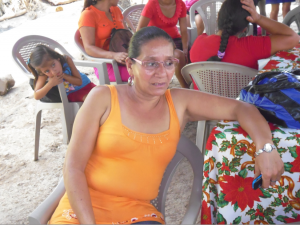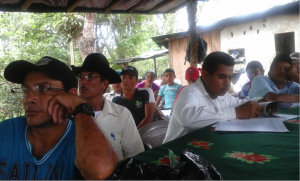Ver en español
A letter from Carlos Cardenas Martinez in Nicaragua
June 2015
Write to Carlos Cardenas
Individuals: Give online to E550030 for Carlos Cardenas’ sending and support
Congregations: Give to D507540 for Carlos Cardenas’ sending and support
Churches are asked to send donations through your congregation’s normal receiving site (this is usually your presbytery).
Dear brothers and sisters:
My warm greetings to all of you from Nicaragua. This newsletter is full of hope and recent impressions shared with local leaders working in rural communities hand-in-hand with CEPAD.
For approximately 15 years I did not visit those remote regions of the country that were the theatre of bloody operations of a fratricidal war that drained the country for many years. This time I want to speak about Pantasma, the north area of Nicaragua, and its people in Jinotega.

Gladys Rizo Blandon participating in a workshop on leadership and communitarian resilience in Pantasma Nicaragua (Photo Carlos Silva)
Recently our Presbyterian Disaster Assistance (PDA) ministry of the Presbyterian Mission Agency (PMA) was a part of a joint journey with our partner, the Nicaraguan Council of Evangelical Churches (CEPAD) to celebrate the World Day of the Earth and the National Ag Day for professionals in the agricultural sciences. I didn´t hesitate an instant and accepted the invitation since it was the only opportunity to check what had happened there in terms of changes and transformation after the war and to share with a fist of small evangelical congregations and the local Catholic community this solemn celebration. I am not going to make detailed descriptions on a journey of a little more than 200km, enjoying my driving across landscapes decorated with mountains, villages, rivers and lakes within Matagalpa and Jinotega. Nevertheless, I have to confess that I was expecting to see a distressing and depressing landscape in the rural life of these communities terribly flogged by the scourge of the war.
Proverbs 3:9: Honor your Lord with your wealth and with the first fruits of your crops.
I was tremendously wrong. I stopped to have a cup of coffee. It was Thursday 6.35 am. Life seems to boil everywhere in Pantasma: children playing in the backyards or running to schools, rural improvised marketplaces full of movement, women working everywhere, cooking or selling fast foods or handcrafted goods, lots and lots of mules and horses overloaded with fruits and sacks of cereals, cheese and milk drums, buses and trucks coming from everywhere or departing to Managua. I saw joy and happiness in people’s faces. In my perception there seemed to be plenty of hope ensured by their own perception of safety and peace. I then realized that is not easy to capture this moment every day, so I wanted to write about it.
It was absolutely the opposite of what I’d expected: the improvement of the road infrastructure and the investment programs of the last four government administrations and the processes of social or civil life, the return to the democratic exercise of the power, the support to the local governments all seem to have achieved a miracle of reconstruction, reconciliation and progress in that region.
Carlos Silva, program manager of the head office of CEPAD in Managua, was waiting for me in Pantasma since he has been deployed to this community provisionally until a new delegate would be hired for Pantasma. Carlos was also in charge of the coordination of activities, including a series of workshops and training for community leaders in which I would have direct participation, talking on disasters preparedness topics, the Integral Risk Management Approach, and other subjects linked to the impact of the climate change and global warming.
The point is that regarding global warming and the impact of the climate change on the faith-based NGOs, people are more convinced than before that—regardless of the anguished and terrific declarations of the Scientific Panel IPCC (Intergovernmental Panel on Climate Change) on the inevitable and devastating consequences of climate change for the near future or the German Watch’s declaration that locates Nicaragua in the 10 most vulnerable countries to these effects—these are useless if our communities are not aware of the concomitant risks and do not take the pertinent steps to anticipate the consequences from the ground level.
All these topics were approached with leaders assembled in an improvised training facility from approximately nine of Pantasma’s communities. I must emphasize that the participation and the interest in these topics was very dynamic and increasingly there were expressions of commitment to continue deepening the education and training. There were mentioned other topics that transfer experiences and provide approaches, methodologies and technologies to address disaster risk reduction and for adaptation to the scenes that climate change progressively demands.
CEPAD dedicates attention to these topics of emergency response and development issues like food security, nutrition and poverty, in which the participation of rural women is a high priority.

Improvised facilities to run workshops in Pantasma, Nicaragua (Photo Carlos Cardenas)
On this occasion I had the opportunity to meet Gladys Rizo Blandon, a charismatic leader for nature whose thirst for knowledge and learning does not seem to have limits, because she always wants to use the knowledge for the well-being of her community and families.
Gladys has created and directs a network of rural women who have been organized to overcome the challenges of poverty, unemployment and the lack of opportunities by means of collective efforts to diversify the scanty income in the community and to improve the quality of life of many women who in the main are mother and father of their homes.
Probably one of so many things that captured my attention in Gladys’ work is her ability to manage and lead the group to consolidation in a group that has his own office of meetings and workshops in the community, “The Prisoner.” There plans are discussed and strategies are designed for the work of new community leadership that considers as central the construction of a communitarian resilience for a people that perceives that in spite of the successful stability certain threats to peace and safety persist—therefore it is pertinent to try to neutralize them.
We shared with Carlos Silva two days and two nights in Gladys’ house and with her family, where the small office of the group of women functioned as our mountain hotel. We had a couple of hours of energy from the electrical plant and also improvised our sources of alternative light.
Also it was amazing to enjoy other beauties of this distant but unforgettable place, as what I called the “Jakuzzy of the mountain,” a natural shower formed by a spring of water surrounded by covered stones of moss, lichens and multicolored orchids and many other tropical plants. CEPAD recently started in these communities a process of accompaniment for five years of rural development, which includes community leadership.
We are grateful to Gladys and her family for this chance to be a part of the daily life and the tasks of her family in this region of the Nicaraguan mountains.
For reasons of space and time let me give my thanks to all of you who contribute with your prayers and gifts to our mission in this corner of the world. Please continue! Thank you for reading my newsletters and keeping Presbyterian World Mission (PWM) and Presbyterian Disaster Assistance (PDA) in your prayers.
May the peace of our Lord be with you, your congregations and families!
Carlos Cardenas
PC(USA) mission co-worker with the Nicaraguan Council of Evangelical Churches (CEPAD)
The 2015 Presbyterian Mission Yearbook for Prayer & Study, p. 65
![]() You may freely reuse and distribute this article in its entirety for non-commercial purposes in any medium. Please include author attribution, photography credits, and a link to the original article. This work is licensed under a Creative Commons Attribution-NonCommercial-NoDeratives 4.0 International License.
You may freely reuse and distribute this article in its entirety for non-commercial purposes in any medium. Please include author attribution, photography credits, and a link to the original article. This work is licensed under a Creative Commons Attribution-NonCommercial-NoDeratives 4.0 International License.